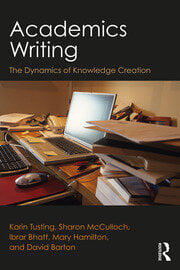The Ebb and Flow of Writing: From Struggle to Unconscious Fluency
It can help to understand writing as a nexus point where lots of different elements intersect. I might be sitting in the garden with my laptop and a can of coke, but there are many other things which are present with me in this moment—from my writing software, internet connection and accompanying eBook reader through to an imagined audience, an intended publisher and an intellectual community. Testing et al suggest we cast the net even wider to include things such as “managerial directives, quality procedures, disciplinary conventions, departmental environment, and discipline-focused, thematic, or linguistic social communities.” There is a whole world intervening on me as I write, even if when the writing goes well it feels like there is just me and my thoughts.
If I’m enjoying writing, I don’t worry about an imagined audience encountering these words for the first time and potentially finding them lacking. The enjoyment itself stems from being grounded in the present rather than projecting forward towards an imagined future outcome. There will be an audience who encounters these words, and it’s certainly possible they may find them lacking. But as I’ve written this paragraph, the experience has been defined by what the political theorist (and prolific writer) Richard Seymour describes as an “unconscious fluency“:
I doubt anyone begins a piece of writing with the rules in mind. Writing is a conscious, effortful process, but most of what works in writing is unconscious fluency. You start, not even with a completed thought, but often enough with a single word or phrase, or a mood, or a tune stuck in your head, that establishes a rhythm. You scarcely think about it. If you’re raging, the words come flying out by the quiverful. If you’re mournful, they’re as slow as tears. The rules come later, as cues during the editorial clean up.
I’m writing these words on what I’d designated as a writing afternoon, but things had not been going according to plan. Various frustrations had intruded on me via e-mail before I got started, leaving me twitchy and irritable as I sat down to write. Despite the fact the weather forecast had promised sun, I found myself in a garden under a cloudy sky struggling to focus. I battled on towards my writing target for the day, with the promise to myself I could stop when I reached a thousand words. But it was a struggle in which I felt my words had to be forced out, leaving me with clunky sentences staring at me inertly from a page of disappointments.
I felt dispirited by failing to make the progress I had expected, which immediately left me worrying about the other things I am committed to finishing over the coming weeks. This project is not one which will ‘count’ greatly from my employer’s point of view; in fact, I’m worried that I’m writing myself into a peculiar niche that will only be read by a handful of people. Should I not be focusing on the journal articles which will count? Am I distracting myself with mindless indulgences from my real work? Is this just a waste of time? Should I give up?
The speed with which I found myself despairing was striking, illustrating how confidence in what we are doing can quickly unravel when it feels as if things are not working. It’s an experience of writing which often makes me think back to one of my favourite poems by Nietzsche:
The pen is stubborn, sputters – hell!
Am I condemned to scrawl?
Boldly I dip it in the well,
My writing flows, and all
I try succeeds. Of course, the spatter
Of this tormented night
Is quite illegible. No matter:
Who reads the stuff I write?
– Friedrich Nietzsche, The Gay Science, Prelude: 59
Or as it occurred to me this afternoon: “this is shit and no one is going to want to read it.”
But when I had reached my target, letting myself ‘give up’ for the day, I turned to reading instead. Hoping that reading for my project would help ensure tomorrow’s writing would not be another ‘tormented night,’ I continued with Testing et al (2021) only to discover the extract I quoted at the start of this section. There was something about their concatenation of elements which might not immediately come to mind when writing (“managerial directives, quality procedures, disciplinary conventions, departmental environment” etc) which prompted my imagination.
I seized upon the idea I could feel germinating within me, and this section emerged in a matter of minutes. It was 631 words, up until the end of that sentence, which flowed out into what had only thirty minutes earlier felt like an arid desert. The sun has started to shine, and it suddenly feels like my ‘writing afternoon’ has lived up to the name, leading the turgid undertaking which preceded it to fade into the background.
Not only do I feel connected once more to what I’m doing, I feel energised, as if the writing has in some real but mysterious sense recharged me. This experience reminds me of the nexus I described at the beginning: how our writing practice sits at the intersection of so many factors, both internal and external. When these elements align, we can move from struggle to that elusive “unconscious fluency” that makes the act of writing not just bearable, but genuinely joyful.

Academics Writing: The Dynamics of Knowledge Creation
Academics Writing recounts how academic writing is changing in the contemporary university, transforming what it means to be an academic and how, as a society, we produce academic knowledge. Writing practices are changing as the academic profession itself is reconfigured through new forms of governance and accountability, increasing use of digital resources, and the internationalisation of higher education. Through detailed studies of writing in the daily life of academics in different disciplin